- Home
- Steven Becker
Storm Clouds Page 8
Storm Clouds Read online
Page 8
There was no need to supervise this part of the operation. Beecher’s men had years of experience using this technique. The sound of the battery-operated hammer drills was barely audible as the men above drilled into the soft rock. Aside from the rockslide that they would eventually trigger, this was the loudest part of the operation. Once the borings were cleaned, the men mixed the grout with water and packed it into the holes.
Thirty minutes later, the men scurried to the truck and loaded up. They were about a half-mile away when the rock face slid down to the desert below. It was a long minute before the debris settled and another one before the dust cleared. After the air was still for several minutes, Beecher directed the truck back to the site. He exited the vehicle and walked to a spot directly below the overhang.
The demolition experts were first out and immediately began combing over the debris to inspect their work. On seeing Beecher below, they moved to an area at the side of the demolitions and dropped a rope to him.
Beecher secured the line to a harness. The lifeline was just insurance, though. The cliff was steep, but the worn limestone offered many hand- and footholds. He felt the tension on the rope as the men above took their positions to belay him. Slowly he began his climb.
Beecher reached the overhang and smiled. There was a gaping void in the rock face. He turned to the men below and issued orders to his foreman.
“Send two men to the top. One watches the valley and the other the desert.” The rockfall may or may not have caused the wrong person to become curious. Beecher’s experience told him that this was Africa and there was nothing to worry about, but he also knew to never trust the locals.
“Let’s get the scaffold set up, then.” The man nodded and started barking orders.
Beecher turned to his demolition experts. “Well done.”
Tonight he would create the portal, but there was no time now to open the secret back entrance. He knew the authorities would make a fuss over the find and a spectacle of the tomb opening. That gave him at least a week to place the relics.
Two hours later, a gantry crane was set up on the top of the cliff and scaffolding was erected to the height of the void. The men on the ground pulled the camouflaged cover from the truck, revealing three rectangular stones and a large slab. Each was rigged with a large steel ring bored and epoxied into the top. Beecher smiled as the truck revved its engine. The thick steel cable from the winch mounted in the truck bed started to wind on itself as the line, which was run up to the crane on top of the cliff and back to the truck, lifted the objects into place.
An hour before dawn, Beecher double-checked his work before rappelling down the cliff face. Even dressed in native robes and with his head wrapped as the other men, he was still identifiable as a European. He sent the men and truck deeper into the desert, where they would wait a few hours, then return to Luxor by a different route. He didn’t have the luxury of returning to the city. The planning of the next phase had to begin immediately, which would be done by another group of workers. Though he had vetted and trusted his men, there was no need for any to know the entire picture.
It was a hot, dusty walk back to the Valley of the Workers, but he had accomplished the first part of his plan. An hour later he approached the parking lot and crossed to his old Range Rover. The site was empty except for some arriving workers. A quick glance around showed no one had any interest in him. Beecher opened the door of his ancient vehicle and yanked off his headscarf. After wiping his face with it, he pulled a cold beer from the cooler in the back. He rubbed the cool can against his forehead before he cracked the lid and took a long sip.
Beecher picked up his phone and made a call. “Grave’s in place. I’ll be expecting that wire before we start placing the objects.”
The voice on the other end of the line was happy to comply.
13
Bethesda, Maryland
Mako and Gretchen stood on either side of John as they helped him to his front door. Both saw he failed to recognize where he was.
Gretchen reached into her purse, where she had stashed John’s personal effects, and withdrew a small keychain. While Mako supported his father, she found the correct key and opened the door. Mako knew he should clear the house first, but with his father weighing him down he had no choice but to haul John into the condo. Gretchen closed the door behind them while Mako dragged John to a chair in the living room. He leaned over with his face close to his father’s.
“I need help, Dad.”
John half-nodded, but before Mako could get anything out of him, his head drooped to one side. A quick check of his vitals showed he was recovering, but at a very slow rate. Each time he had regained consciousness, John had seemed more lucid and was awake for longer.
Mako feared the recovery process was too slow. They had to get what they came for and get out before anyone tracked them.
Mako studied the small living space. Though the condo had only two bedrooms and one bathroom, he knew finding John’s stash was going to be difficult. A cursory examination found nothing out of place in the walls or floors. He might have missed something, but Mako decided to check the ceiling before performing a more thorough search. The attic access panel in the closet was too obvious, but Mako pulled down the stairs and checked anyway. Finding nothing, he replaced the hatch and inspected the ceiling. Beside the air-conditioning vents and recessed lighting, the ceiling was void of any openings.
He knew any of the light fixtures could conceal a small stash, but he was looking for something bigger. Walking through a house, you expected to get a picture of the person living there. John Storm’s home contained nothing personal. Aside from the history books and his computer, which was certainly encrypted, the condo was sterile.
Dispirited, Mako sat on the couch and stared at the fireplace mantle. In most homes, this would hold family pictures. He might expect to see a picture of himself there. But the surface was empty and the gas logs looked unused.
The fireplace had to be the answer. Moving toward the hearth, he knelt in front of the unit and removed the thumbscrews holding the glass panel in place. Next he pulled each log from the pegs holding them together. As he removed the grate, he realized that there was no gas burner and knew he had found it.
The flue was too obvious a place, like the attic access. Instead of looking up, he looked down. The narrow outline of an access panel was barely visible in the floor of the unit. Mako knew he had found his father’s stash when he saw a flash of shiny metal from the otherwise black heads of two of the screws. John had never been the patient type and had stripped them. Mako glanced back at Gretchen, who was trying with little success to get some liquid into John. Leaving them, he went to the garage, found the correct screwdriver, and returned to the fireplace.
The right tool for the right job, one of Mako’s uncles had taught him. It had been a bright point in his education when he learned that he could actually work on engines, since other attempts at woodworking and gardening had failed miserably.
John had partially stripped the screws using a #2 bit, where a smaller #1 was the proper size. Mako quickly had the six screws out and lifted the panel.
In the small recess, where he would have expected to see gas piping, lay a rectangular, fireproof box. Mako pulled it out and moved to the coffee table. Gretchen, having given up on John for the time being, hovered over his shoulder.
Several manila envelopes were neatly stacked inside the box. Each had a name written on the front that Mako was unfamiliar with. Mako removed them one at a time and dumped their contents in piles on the table. Passports, cash in the currency of the country of issue, and several credit cards were in each envelope. Hidden below the envelopes were a half-dozen burner phones and two pistols: a Glock small enough to easily be concealed and his father’s weapon of choice, a Colt H&K. There was plenty of cash, almost too much to use in an economy that preferred credit cards and was now suspect of hard currency. Credit cards were even more essential for travel now that th
e TSA had started flagging travelers paying for their tickets with cash.
Gretchen removed a maroon-colored passport with “European Union” written in German. She glanced at the identification page and then at Mako. “You could pass for this.”
Mako grabbed the passport and examined the photograph. With a little gray in his temples, he could. He read the name and checked the expiration date, knowing that John would never allow something so valuable to expire.
“What about you?” Mako asked, as he sifted through the pile. It appeared there were three separate identities complete with passports and credit cards—all for men. He removed the cards in the name of Wolfgang Messer, matching the German passport.
“I’ve got my passport. But where are we going and what are we going to do about John?”
“The vet should be enroute.”
“Right.”
Gretchen made the call, leaving the address as a message. “Done.”
Mako sorted out the pile of paperwork on the table. He returned everything to its place with the exception of Wolfgang Messer, which he swapped for his own identification and credit cards. Last he picked up the Glock and, knowing his father, did a quick chamber check. The shine of brass caught his eye and he gently released the slide.
“That’s not going to be much help where we’re going.”
“No, but it might until we get to the airport.” He ejected the magazine, noted that as he expected it was full, and replaced it. Mako got up and replaced the box in the fireplace. After fastening the panel down, he reassembled the unit and rose. “Ready?”
“We can’t leave him here like this.”
Mako checked his watch. “Help should be here in a few minutes. It’s advisable that we are not.”
Gretchen began to protest, but Mako started for the door. He had noticed John’s car in the garage when he was looking for the screwdriver and grabbed a set of car keys from their hook in the kitchen. Gretchen followed. Mako started the Acura, noting at once the lack of power as he backed out the driveway. A hundred yards down the road, a plain-paneled van passed them. Mako suspected the vet had arrived.
“Can you get us a flight out?”
“You know you can’t just fly to Cairo, right?”
“Out of this country would be good for a start.”
The closest entrance to the Beltway was a mile north, where Mako turned onto the southbound on ramp. They traveled in silence; Mako’s focus alternating between the rearview mirror and the road ahead, while Gretchen was buried in her phone. He reached the exit for Reston and Dulles airport, and with no sign of a tail turned onto westbound 267. By the time he reached the long-term parking lot, Gretchen had booked flights.
Mako normally would have opted for short-term parking and forwarded the bill to Alicia. It wasn’t the money that made his decision this time, but the anonymity of the long-term lot. He found a remote space and parked. He exited the car and was walking toward the plexiglass shuttle station when he felt a hand on his arm.
“Might want to leave the gun?” Gretchen said.
Mako pursed his lips and cursed under his breath. He knew John had a suitcase that would allow a broken-down weapon to pass through security, but there was too much at stake to attempt to take a handgun into a country like Egypt. Mako backtracked to the car, unlocked the door, and stashed the weapon under the driver’s seat. He locked the car and walked toward the bus stop.
Frankfurt, Germany
Mako was worried about connecting through Frankfurt. The airport wasn’t in the top ten most secure airports in the world, but from his experience they were certainly trying. That was both good and bad.
Exiting the gate, they followed the signs in German and English to the connecting flights area. Once there, he was surprised to see a security checkpoint.
“Passport, please,” the agent asked in accented English.
Mako reached into his jacket pocket and was about to remove his passport when he realized it was German issued and he would be expected to know the language. Gretchen must have anticipated the problem and, smiling at the guard, calmly took it from him. Along with hers, she handed both to the officer. They had a quick exchange in German and she was waved through.
Mako froze when the officer held up his passport and stepped in front of him. He said something in German to another officer.
“Shit,” Mako muttered, loud enough that the officer turned his head, but low enough he hadn’t heard exactly what was said. Before Mako could begin to speculate how his cover had been blown, Gretchen leaned close.
“Standard procedure. They pick one out of twenty at random for more intense screening. Just bad luck.”
And there was the problem with an airport trying to increase their security rating. Mako accepted her explanation, but wasn’t happy or convinced until he was led to an area with a dozen or so other confused travelers. Seeing the other anxious people who had been separated from their families calmed him. Being chosen for the additional layer of security screening was nerve-racking, but he knew if there was someone following him, it would throw them off the scent.
The group was taken to a separate security area and essentially strip-searched. His level of anxiety soon matched the other travelers as he became frustrated at the slow-moving line. He checked his watch, realizing that he would be lucky to make their next flight. Finally, it was his turn. Pockets emptied, shoes, socks, and belt removed, Mako stepped toward the state-of-the-art body scanner. He passed through and exhaled as he was handed back his passport. After dressing, he strode toward the terminal and found an anxious Gretchen.
Mako boarded the flight to Cairo, convinced that he’d remained incognito.
Four-and-a-half-hours later, Mako studied the airport and surrounding areas below as the pilot made his final approach to Cairo. After disembarking they followed the long line of passengers up an escalator to a long corridor. The walk seemed like miles before they reached Egyptian customs and immigration, where he passed through easily. Tourists were in high demand and the officials had orders not to ruffle feathers. Gretchen had arranged for a driver and guide, who met them just outside the terminal doors.
“Alaa,” the thin man said, extending his hand.
“Hello, Alaa,” Gretchen greeted him, and he smiled back.
“I take you to your hotel and tomorrow we see the sights, yes?”
Mako was worried that the driver had attached himself to them, but he quickly changed his mind as soon as they backed out of the parking space. Egypt was not a do-it-yourself country. Horns blared and curses flew as Alaa navigated out of the parking lot. After a heated argument with the man in the parking lot ticket booth that required the summoning of his superior, Mako began to understand the value of their new friend.
Gretchen leaned close enough that she could talk without being overheard. “Things are different here. They were fighting over thirty Egyptian pounds.”
Mako didn’t think that was so bad.
“That’s less than two dollars American,” she said.
The driver turned his head and smiled. “But I won.”
14
The Valley of the Kings, Luxor, Egypt
Wired after the chaos of Cairo and from the time change, Mako tried to unwind as the van left the city. They could have flown to Luxor in a fraction of the time, but that meant navigating airports and, being a foreigner, his passport would certainly be closely checked. He wasn’t worried as much about that as what he had seen as they passed through the security checkpoints on the way out of the airport. He and Gretchen had watched as people were pulled out of line by male and female agents for no apparent reason. Both their bodies and their bags were meticulously searched, which usually didn’t end until something, no matter how innocuous, had been confiscated.
The word he would use to describe the searches was “random.” He had been lucky in Frankfurt. Mako had no plans to test the water here. Alaa had mentioned there would be spotty cell service for the majority of the drive.
He turned his phone and earbud off. Finally he fell asleep.
The timing worked well, and they arrived just after eight in the morning. Mako’s first impression of Luxor was considerably more favorable than Cairo, most of which he attributed to the difference in size. Cairo’s population was more than twenty times that of Luxor. The smaller city was noticeably cleaner—though that was a relative term here—and less congested. Watching the people interact with each other, they seemed friendlier. Children dressed in uniforms on their way to school gave the city a more Western feel.
Mako needed a place to start his search. Alaa seemed genuine, but Mako was reluctant to break out the paper copy of the map. Instead he turned his phone on and opened the picture of the map. Gretchen leaned in as he panned and zoomed.
“There are no reference points.”
Mako felt the warmth of Gretchen’s body next to his and again wondered about her involvement. This was dangerous business for an untrained civilian, which was the classification of anyone not an indoctrinated agent. He couldn’t afford even a small part of his concentration to be distracted by watching over her, but some primordial instinct seemed to be overriding his training.
He tried to separate his growing feelings from the task at hand. Mako knew the best chance to solve the puzzle was to include Alicia, but both his father and Gretchen had warned him against it. There were too many players for Mako to wrap his head around.
His father was a straight shooter who would put his principles above personal loss or financial gain. His train wreck of a private life was a testament to that. Alicia was also a given, in a different way. Contracts were contracts to her. Once accepted, her only goal was to complete them. She never asked more than where, how, and when. Because of this, in this case Mako’s trust was in his father. John Storm always asked who and why first.

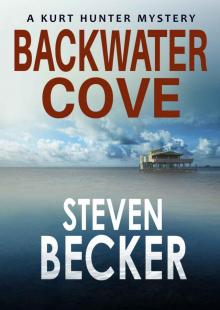 Backwater Cove
Backwater Cove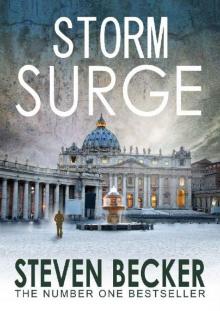 Storm Surge: A Fast Paced International Adventure Thriller (Storm Thriller Series Book 3)
Storm Surge: A Fast Paced International Adventure Thriller (Storm Thriller Series Book 3)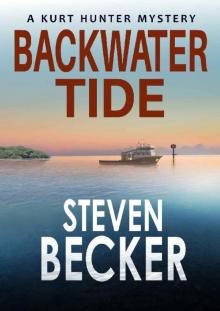 Backwater Tide
Backwater Tide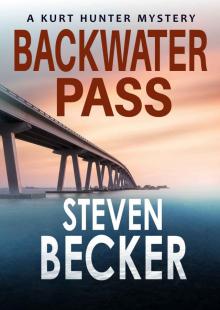 Backwater Pass
Backwater Pass Backwater Flats
Backwater Flats Wood's Revenge
Wood's Revenge Haitian Gold
Haitian Gold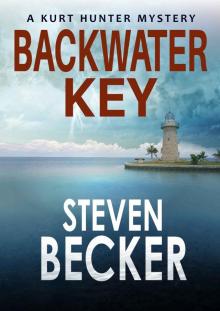 Backwater Key
Backwater Key Wood's Tempest
Wood's Tempest Uncharted Waters
Uncharted Waters Tuna Tango
Tuna Tango The Wreck of the Ten Sail
The Wreck of the Ten Sail Backwater Bay (Kurt Hunter Mysteries Book 1)
Backwater Bay (Kurt Hunter Mysteries Book 1) Storm Clouds
Storm Clouds Wood's Wall
Wood's Wall Wood's Reach
Wood's Reach Wood's Fury
Wood's Fury Storm Rising
Storm Rising Bonefish Blues
Bonefish Blues Wood's Harbor: Action & Sea Adventure in the Florida Keys (Mac Travis Adventures Book 5)
Wood's Harbor: Action & Sea Adventure in the Florida Keys (Mac Travis Adventures Book 5) Wood's Reach: Action & Sea Adventure in the Florida Keys (Mac Travis Adventures Book 6)
Wood's Reach: Action & Sea Adventure in the Florida Keys (Mac Travis Adventures Book 6) Wood's Wreck
Wood's Wreck Wood's Harbor
Wood's Harbor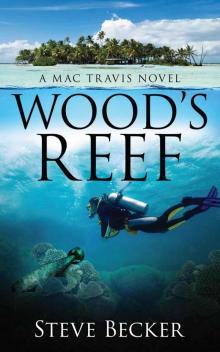 Wood's Reef
Wood's Reef Backwater Bay
Backwater Bay